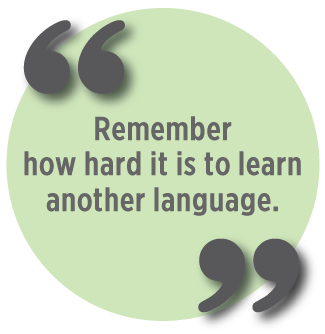9 Ways New ELT Teachers Can Succeed
by Laura Dzieciolowski
 Much like language production itself, teaching is a
complex cognitive process that requires mastery of both practice and theory.
All teachers experience some failures throughout their career and reevaluate
to learn better methods. This is a natural part of the process, and, just like
everything else in life, the learning never stops. I present to you the
teaching hacks that I would tell myself if I could go back in time to the
beginning of my career and speak to early 20s Laura, trembling in front of her
teaching practicum students.
Much like language production itself, teaching is a
complex cognitive process that requires mastery of both practice and theory.
All teachers experience some failures throughout their career and reevaluate
to learn better methods. This is a natural part of the process, and, just like
everything else in life, the learning never stops. I present to you the
teaching hacks that I would tell myself if I could go back in time to the
beginning of my career and speak to early 20s Laura, trembling in front of her
teaching practicum students.
1. Value Your Time off Work
Having a
social life and interests outside of work allows you to be healthy and happy,
which in turn enables you to approach your work with a better mindset. You do
not need to make yourself available to your boss, coworkers, and students 24/7
to be a great teacher. If you are not someone who is able to ignore work emails
during evenings and weekends, consider having a separate email for work where
you can pause your inbox. Gmail users can download Google’s free extension Boomerang to
accomplish this.
Also,
remember to consider your time off when you decide what contact information to
share with your students. For example, if you share a messaging app contact,
you could very well end up receiving messages at all hours of the night or
during your vacations. Valuing and protecting your free time is an important
part of setting boundaries for your work-life balance, which is an important part
of self-care.
2. Spend Less Time Lesson Planning
New teachers
will often craft the most perfect and meticulous lesson plans for each class to
feel safe and prepared. Often, these teachers stay in the office later than any
of their coworkers. There is nothing wrong with being prepared, but there is a point
where the amount of time invested in adding nitpicky details to a lesson plan
stops correlating to a better lesson. Learn what that amount of time is
because you will burn out if you spend hours and hours lesson planning every
day.
 3. Talk to Senior Coworkers
3. Talk to Senior Coworkers
One of the
most productive ways to save time lesson planning is to talk to your coworkers.
Why reinvent the wheel? Make friends with senior and experienced coworkers and
ask to share materials and insights on what lessons have worked before for
students in this context. Most people will be happy to help you and pass on
their experience and knowledge. Your coworkers are the only ones who understand
exactly what it is like to teach and work in your context.
4. Use Textbooks Mindfully
Textbooks
are meant to be a resource to help the teacher facilitate learning and practice
in class, not determine the semester curriculum. Because there is no one
standardized textbook that can be adapted to every teaching context and
proficiency level, it is the teacher’s job to evaluate which content from the
book best suits the class’s needs and adapt it as necessary. A few important
adaptations you should consider:
-
Personalize examples to
students’ home languages and interests.
-
Omit irrelevant exercises.
-
Supplement important
lessons that were not fully grasped from the exercises provided with other
sources.
5. Research What Your Students Need
To best help
students achieve their professional goals, a teacher needs to understand what
students want to accomplish after the class and what skills they need to do so.
Here are a few ways to figure this out:
-
Talk to your senior
coworkers about what students in the past have needed, and to students about
their goals.
-
Give your students a needs
analysis survey at the beginning of class.
-
Check the job adverts or
university requirements for studying abroad that your students are interested
in.
Use the
information you find to inform your teaching. If your students need to improve
their speaking, scaffold them into having discussions and give them lots of
time to speak in class. If the reality is that your students need to have a
certain TOEIC, TOEFL, Cambridge or IELTs score to achieve their professional
goals, set aside time in class to practice test-taking exercises. Focus on the
most important skills that your students need to acquire to achieve their
academic and professional goals.
6. Create a Student-Centered Classroom
Effective
teachers know that communicating in another language is not simply amassing a
collection of information, but rather developing a complex cognitive skill that
requires a lot of practice. You can ensure that you are providing your students
enough space to practice production by analyzing your lecturing time.
One way to
reflect is to record your teaching. A general guideline accepted by the
language teaching community is that a teacher’s talking time should not exceed
30% of a lesson. Of course, the appropriate amount of time a teacher should
talk depends on the objectives of a lesson and where it fits into the overall
course (Nunan, 1991). In general, though, if you find yourself lecturing more
than 30% of the time in most of your classes, it is probably time to start
incorporating more student-led tasks, pair and group work, discussions, and
hands-on activities.
7. Be Understanding
Remember how
hard it is to learn another language. To create new cognitive frameworks, the
brain requires vast amounts of input and consistent practice over a long period
of time. To expect that students will never make a mistake related to a new
language lesson after reviewing it once in class is unrealistic and uninformed.
Internalizing new lessons requires multiple reviews and a great deal of
production practice.
To develop a solid foundation of understanding from which
to draw patience, it is a generally accepted recommendation among the language
learning community that a teacher should partake in the experience of learning
another language themselves to at least a high intermediate level. Many job
offers even make this a requirement. Whether or not it is required for your
position, consider taking up the learning of a second language if you have not
already; being intimately familiar with the language learning process—through
personal experience—will help you better understand and empathize with your
students, which will make you a better teacher.

8. Be Open-Minded
A beautiful
part of being a language teacher is the multiculturalism and cultural diffusion
that are inevitable in the profession. There are two great rules of thumb to
collaborate tactfully with people from other cultures. The first is to never
try to define other people’s culture to them. Let people tell you what their
culture (and identity) is and what it means to them.
The second
is to avoid ethnocentrism: the belief that your own group or culture is
superior to all others. Our responsibility as teachers is to help our students
achieve their professional and academic goals. It is a good idea for us to
reflect on whether we are keeping our national, political, and religious
affiliations in check: Our students may not need or want to convert to our
groups and ideologies to achieve their goals and be successful in their lives.
Instead, we can teach our students agency by showing them how to respect
differences between cultures and how to succeed as global citizens.
9. Get Involved With Conferences and Publications
Conducting
research and presenting at conferences can seem intimidating and inaccessible
to all but well-known publishers of the field with pages of quantitative data.
The truth is that sharing a successful lesson plan with a handout or giving
tips on a specific teaching context that you have experience with is also
research (see: this article).
Start slow
and build up. Copresent a poster session with a coworker at a local conference
and work up to presenting alone. Many conferences have 101 workshop sessions
meant to share tips with new teachers. Make sure to learn how to get research
funding when possible from your employer to cover transportation, lodging, and
conference fees. There are also plenty of publishing opportunities that do not
require original research, such as the newsletters for regional associations
for language teachers; TESOL’s TESOL
Connections; TESOL’s interest
section newsletters; or the quarterly journal English
Teaching Forum, published by the U.S. Department of State.
Publishing articles and participating in conferences helps new and experienced teachers
alike develop professionally, become better teachers, and improve the teaching
community.
The choice to be a teacher carries considerable
moral responsibility: to help others develop the skills and knowledge they need
to better themselves and the communities in which they live (Osguthorpe
& Sanger, 2013). With the right mindset, it can be a noble and
rewarding profession well worth its learning curve. Although experiencing some
setbacks is inevitable while becoming a seasoned English language educator, by
following these tips, you will be able to have smoother sailing throughout your
career.
References
Nunan, D.
(1991). Language teaching methodology: A textbook for
Teachers. Cambridge University Press.
Osguthorpe, R., & Sanger, M.
(2013). The moral nature of teacher candidate beliefs about the purposes of
schooling and their reasons for choosing teaching as a career. Peabody Journal of Education, 88(2),
180–197. 10.1080/0161956X.2013.775871
Laura
Dzieciolowski is a global teaching fellow
at Tokyo International University in Japan. She graduated with an MA in second
language studies with a double specialization in language teaching and program
evaluation from the University of Hawai’i at Manoa. She has been teaching at
Tokyo International University for 4 years and has also taught in Hawai’i,
Spain, and Kuwait.